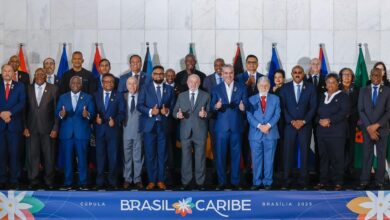MINISTERIAL STATEMENT
COP28 is a milestone for the climate agenda.
CARICOM Environment Ministers met in Miami on October 18th 2023 to initiate their final preparations for the annual Climate Change Conference (COP28) to be held in the United Arab Emirates from 30 November to 12 December.
COP28 will mark a major milestone for the implementation of the Paris Agreement on Climate Change. It is the endpoint of the First Global Stocktake, a two-year process involving a technical analysis of global progress on commitments to keep global warming below 1.5°C, to support vulnerable peoples and countries to respond to the impacts of climate change, and to deliver climate finance to accelerate climate action and bolster climate ambition.
The world is off-track to achieve the Paris Goals.
The Global Stocktake confirms the Intergovernmental Panel on Climate Change (IPCC) Sixth Assessment Report.
More than a century of burning fossil fuels has led to global warming of 1.1°C above pre-industrial levels. The unprecedented impacts are already being felt in the region. They will worsen with every tenth of a degree of warming. The call of 1.5, is therefore not a slogan for the Caribbean; it represents securing our environment, the survival of our people, and the sustainability of our way of life, culture, societies and economies.
Vulnerable people continue to pay the highest price of global inaction, for a problem they did not cause and to which they contribute little.
In the past few months, the Caribbean has been experiencing record-breaking heat. The Ministers discussed the cascading negative impacts on people, plant-life, productivity, the availability of potable water, marine flora and fauna, agriculture and animal husbandry, and every sphere of social and economic activity.
They also expressed consternation for the rising costs to cope with these impacts. From the household, national and regional scale, budgets are straining to pay for the needed transition and resilience-building in an increasingly unfavourable global economic environment. Even more concerning is the failure of the international development and financial system to provide adequate support to the Caribbean, despite the United Nation’s recognition over thirty years ago that Small Island Developing States (SIDS) are a special case for sustainable development and therefore a matter of international concern.
The Caribbean is fighting for climate justice.
Notwithstanding the grave injustice being perpetrated on the Caribbean people because of climate change, the Ministers reaffirmed their resolve to fight to preserve lives and livelihoods. The region is actively engaged to correct this injustice including through the Bridgetown Initiative and the launch of the first Multi-dimensional Vulnerability Index (MVI). The Caribbean is setting new innovative finance trends with debt for climate and conservation swaps, and the pursuit of pursuit of high-integrity market opportunities to maintain the natural carbon sinks of our forests and marine resources, while also reaching out to the International Tribunal for the Law of the Sea (ITLOS) and the International Court of Justice (ICJ) to ensure that the rule of law and climate justice prevail.
COP28 is an opportunity for the world to do its part.
The Ministers look to the COP28 and the First Global Stocktake as an opportunity for the international community to demonstrate that it is ready to scale up its ambition on climate to keep 1.5°C alive!
The Group of 20 Members, responsible for over 80 percent of global greenhouse emissions, must act now!
The advanced economies of the G20 have a historical responsibility to do so. They should take the first steps to urgently course correct by:
- aligning their 2030 emissions targets to a 1.5°C mitigation pathway, peak emission before 2025, and end the trillions of dollars in fossil fuel subsidies.
- delivering enhanced economy-wide nationally determined contributions in 2025 in line with science of 1.5°C
- confirming the delivery of the US$100 billion per year and any accrued debt since missing the 2020 timeline.
The Ministers noted that in the face of the scale of the challenge, these commitments are but the bare minimum given that, by 2030, the climate finance gap for developing countries is expected to be US$340 billion for adaptation alone and US$580 billion for loss and damage. A further US$4 trillion will be required to implement the 2030 sustainable development agenda with over half of that amount required for developing countries’ energy investment needs. The Ministers considered that COP28 should prepare the way for elaboration of a new climate finance goal in 2025 that will best respond to the needs of developing countries.
The Ministers acknowledged that public sector finance will not be the only source to settle the climate bill but for the Caribbean it is the main source of support. They noted that reform of the international financial architecture to remove barriers to accessing concessional forms of finance for Caribbean SIDs must be urgently pursued and accomplished.
The Ministers underscored the narrowing window of opportunity in this decade to keep 1.5°C within reach. They acknowledged that meeting this challenge will not alleviate the economic and non-economic loss and damage already being experienced in the Caribbean. They lamented that one year has passed and the hard won historic decision at Sharm el-Sheikh to establish a loss and damage fund is yet to take effect. COP28 must deliver a decision to operationalize a fit-for-purpose, and adequately resourced Fund to ensure the dignity of the people on the frontline. This is considered critical and urgent.
The Ministers also reaffirmed their support for the Caribbean Development Bank’s proposal to host the Santiago Network for Loss and Damage and urged the early selection of the host so that the Network can begin its work. The vulnerable cannot be made to wait any longer.
The Ministers considered the breadth of the issues to be taken up at COP28. They expressed their support for:
- a new framework for the global goal on adaptation that supports locally-led adaptation efforts;
- the establishment of the groundwork for a just and equitable global transition away from fossil fuels with developed countries taking the lead; and
- a work programme for just transition premised on the principle of leaving no one behind and having regard for the unique circumstances of small island developing states.
They underscored that these outcomes must be coherent and consistent with the outcomes of the First Global Stocktake.
The only choice is 1.5°C.
The Ministers resolved to work together with all other nations and stakeholders to ensure that the decisions taken at COP28 will foster equitable outcomes for all. The Ministers are convinced by the science and by the Region’s experience that the only choice we have for a sustainable future is the 1.5°C pathway. If we are to secure a liveable future for all, then COP28 must deliver urgent action consistent with 1.5°C. It is time to walk the walk.





